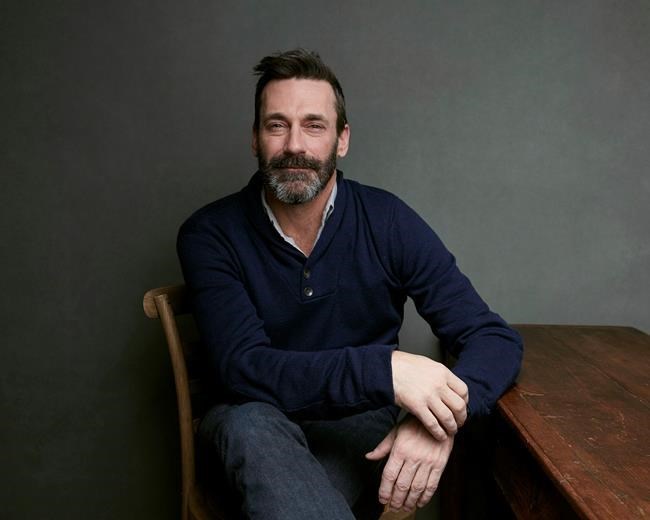
Jon Hamm poses for a portrait to promote the film "Beirut" at the Music Lodge during the Sundance Film Festival on Monday, Jan. 22, 2018, in Park City, Utah. Between the five languages spoken onset, bureaucracy issues and speedy month-long shoot during Ramadan when Muslim crew members were fasting, producers on the new hostage drama "Beirut" "moved mountains" to shoot in Morocco, says star Jon Hamm. THE CANADIAN PRESS/AP, Taylor Jewell, Invision
April 09, 2018 - 7:14 AM
TORONTO - Between the five languages spoken on set, bureaucracy issues and speedy month-long shoot during Ramadan when Muslim crew members were fasting, producers on the new hostage drama "Beirut" "moved mountains" to shoot in Morocco, says star Jon Hamm.
Much has been made of the fact that filming took place in Morocco to tell the story of a U.S. diplomat, played by the former "Mad Men" star, who flees Beirut after tragedy strikes at his home in 1972.
His character reluctantly returns 10 years later, during the Lebanese Civil War, in a bid to negotiate for the release of a colleague kidnapped by the fictional Militia of Islamic Liberation. Rosamund Pike plays a CIA operative who helps him.
When the trailer came out, some viewers and news organizations criticized the film for being shot outside of Lebanon and lacking actors of Lebanese descent.
But Hamm says the film that hits theatres Friday "was exceedingly well researched" and shot in Morocco not because it was easy but out of necessity.
"If people are wondering why a movie isn't cast with all Lebanese people, that's not how movies are made, at all," said Hamm, who won two Golden Globe Awards for playing enigmatic Manhattan advertising exec Don Draper on "Mad Men."
"Why it wasn't shot in Beirut is because you can't get insurance issued in Beirut and because Beirut doesn't look like Beirut did in the 1970s and '80s.
"There are just practicalities of moviemaking that I think a lot of people either don't understand or they're a part the outrage machine that just exists to create controversy and therefore either create clicks or page views or what have you," continued Hamm, in a phone interview from Los Angeles.
"That's the world we live in now. If you're not outraged by something, it's like you're not even trying. So it's a shame, because I think it devalues actual, legitimate anger and outrage, it seems. If everything is a 10 on the 'I'm serious' scale, then what's the measure, really?"
Hamm noted the story was told from an American perspective rather than that of someone in Lebanon because that's the nationality of himself as well as screenwriter Tony Gilroy and director Brad Anderson.
"We live in interesting times now when people talk about, 'Well what perspective are you coming from and why isn't it told from this and why isn't it told from that?'" Hamm said.
"You can go down that rabbit hole until you spin yourself dizzy or you can accept that we as storytellers can really only tell the story from our own perspective.
"I can't adopt a Lebanese persona or a Middle East persona. That's for someone in Lebanon to do, and I'm sure there are films that are doing that. But I didn't get offered those films."
Hamm said Gilroy wrote "Beirut" on spec after penning 1992's "The Cutting Edge." It went through various stages of development before this incarnation.
The story looks at the beginnings of institutionalized terrorism, which Hamm feels is "not an unsolvable problem."
"I think it's never a bad time to remind people that when the talking stops, that's when the fighting starts," he said.
"It's an interesting time anyway, obviously, with the situation in the White House and with the situation on social media, and the confusion as to what's real and what's fake and people playing into those fears and playing into that confusion.
"Instead of trying to clarify, it seems like the impetus is on trying to muddy it further to further your own political agenda and that just seems to be completely counter-productive. But I think there's never a bad time to have a conversation about 'Let's solve the problems, let's not add to them.'"
Hamm's other latest projects include a guest role in the Canadian digital comedy series "The Amazing Gayl Pile," which airs on NBCUniversal's Seeso and CBC Comedy.
"I read it and I was like, 'Well, this is about as weird as it gets and I like it,'" said Hamm, who's become as much a star in the comedy world as he has in drama, on projects including "30 Rock," Bridesmaids" and "Unbreakable Kimmy Schmidt."
"Sometimes I get offered things and I think, 'This will be fun or this will be interesting or weird. Let's just do it.'"
News from © The Canadian Press, 2018